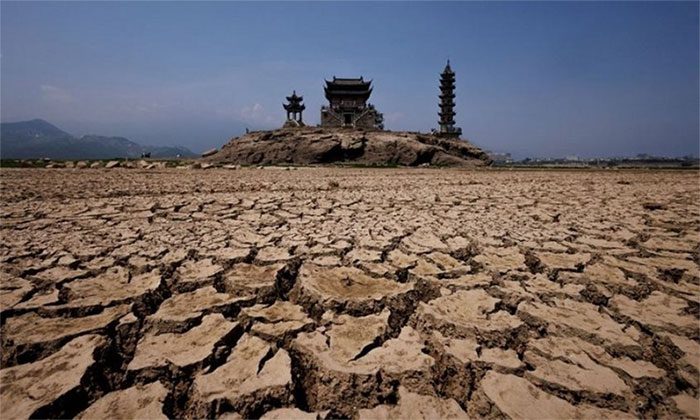Lake Poyang Dries Up, Revealing Ancient Island Due to Record Heat.
Video: SCMP
As the largest freshwater lake in China with an area of 4,400 km2, Lake Poyang is often referred to as the “kidney” of Jiangxi Province for its role in regulating the flow of the Yangtze River, absorbing floodwaters during the humid summer and releasing them in the dry autumn and winter. This year, record heat across the Yangtze River basin has persisted for over 70 days. The lake has shrunk earlier than usual and currently covers only one-fifth of its size from a few months ago, according to a report by Reuters on August 24.
Local residents have never witnessed such a sight. “Last year, there was still water in the lake. This year, I don’t know what is happening. The lake is too dry,” shared Zhang Daxian, a local fisherman.

Lacthing Island in Lake Poyang.
Typically, during the dry season, the base of the over 1,000-year-old Lacthing Island remains submerged. However, this year marks the earliest time in 71 years that the island has been completely exposed. Now, the island is surrounded by grassy land instead of water.
On August 24, locals could walk on the cracked lakebed, littered with dead clams and fish. The shrinking lake has also impacted waterway activities and drinking water supplies for nearby communities. Authorities have released water from the reservoirs at the Three Gorges and Danjiangkou to alleviate the water shortage downstream. Du Lei, an engineer at the remote sensing center of the Ministry of Natural Resources, stated that the lake level continues to decline. Some smaller rivers feeding into the lake have completely dried up.
For Lake Poyang, drought is just part of the problem. High demand for construction materials such as glass and concrete has turned the lake into a source for sand extraction. This activity has contributed to the unusually low water levels in recent decades. Lake Poyang is a national nature reserve, home to over 300 species of migratory birds, including the critically endangered Siberian crane.



















































